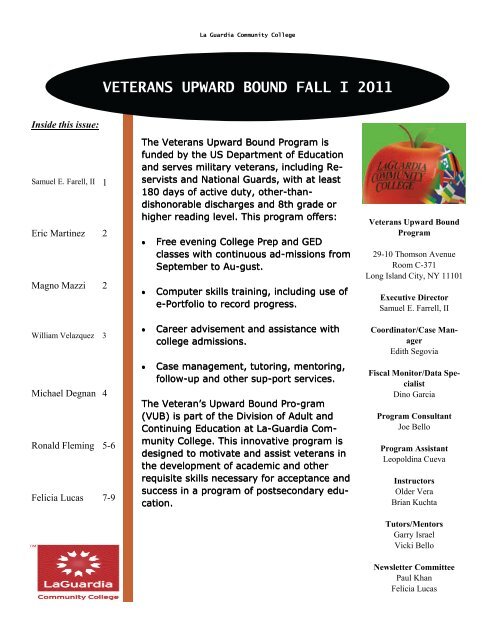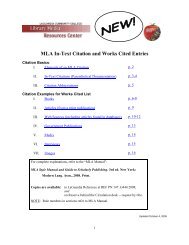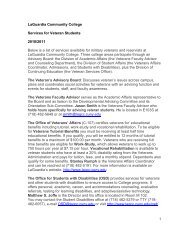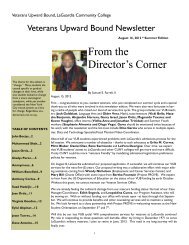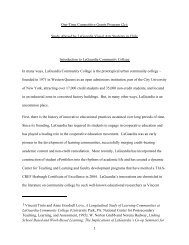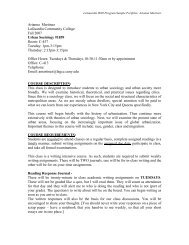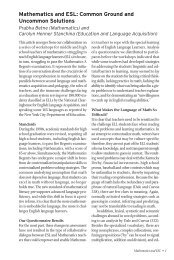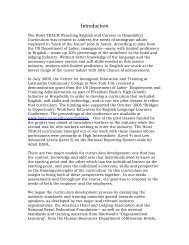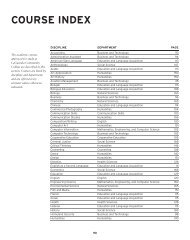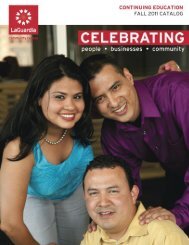Fall - 2011 Newsletter - LaGuardia Community College - CUNY
Fall - 2011 Newsletter - LaGuardia Community College - CUNY
Fall - 2011 Newsletter - LaGuardia Community College - CUNY
You also want an ePaper? Increase the reach of your titles
YUMPU automatically turns print PDFs into web optimized ePapers that Google loves.
La Guardia <strong>Community</strong> <strong>College</strong><br />
VETERANS UPWARD BOUND FALL I <strong>2011</strong><br />
Inside this issue:<br />
Samuel E. Farell, II 1<br />
Eric Martinez 2<br />
Magno Mazzi 2<br />
William Velazquez 3<br />
Michael Degnan 4<br />
Ronald Fleming 5-6<br />
Felicia Lucas 7-9<br />
The Veterans Upward Bound Program is<br />
funded by the US Department of Education<br />
and serves military veterans, including Reservists<br />
and National Guards, with at least<br />
180 days of active duty, other-thandishonorable<br />
discharges and 8th grade or<br />
higher reading level. This program offers:<br />
<br />
Free evening <strong>College</strong> Prep and GED<br />
classes with continuous ad-missions from<br />
September to Au-gust.<br />
<br />
Computer skills training, including use of<br />
e-Portfolio to record progress.<br />
<br />
Career advisement and assistance with<br />
college admissions.<br />
<br />
Case management, tutoring, mentoring,<br />
follow-up and other sup-port services.<br />
The Veteran’s Upward Bound Pro-gram<br />
(VUB) is part of the Division of Adult and<br />
Continuing Education at La-Guardia <strong>Community</strong><br />
<strong>College</strong>. This innovative program is<br />
designed to motivate and assist veterans in<br />
the development of academic and other<br />
requisite skills necessary for acceptance and<br />
success in a program of postsecondary education.<br />
Veterans Upward Bound<br />
Program<br />
29-10 Thomson Avenue<br />
Room C-371<br />
Long Island City, NY 11101<br />
Executive Director<br />
Samuel E. Farrell, II<br />
Coordinator/Case Manager<br />
Edith Segovia<br />
Fiscal Monitor/Data Specialist<br />
Dino Garcia<br />
Program Consultant<br />
Joe Bello<br />
Program Assistant<br />
Leopoldina Cueva<br />
Instructors<br />
Older Vera<br />
Brian Kuchta<br />
Tutors/Mentors<br />
Garry Israel<br />
Vicki Bello<br />
<strong>Newsletter</strong> Committee<br />
Paul Khan<br />
Felicia Lucas
FROM THE DIRECTOR’S CORNER<br />
By: Samuel E. Farrell, II<br />
I missed out on progress updates on our Veterans Upward Bound (VUB)<br />
students since I was away for a few weeks. Nevertheless, I congratulate<br />
both students and staff members who make this cycle another successful<br />
one. And a special “Thank you” to those who helped put together this<br />
newsletter edition.<br />
While our eyes are on the upcoming VUB competitive proposal application<br />
for 2012/2017 that is due next March, right now we are exploring strategies<br />
to increase our enrollment of veterans who are both low income and firstgeneration<br />
college students. In the next six months, we plan to use <strong>LaGuardia</strong>’s<br />
<strong>CUNY</strong>-on-Wheels Bus for computer skills workshops in veterans’<br />
housing communities. Over the last two years, we have been successful<br />
with this 12 Internet-access computer-bus at the New Era Veterans facility<br />
(Bronx) and at the United Veterans Beacon House in Bay Shore in Long<br />
Island. Last month, our outreach services were enhanced through Jamila<br />
Hammami, who assists Edith Segovia, our VUB Case Manager/Coordinator.<br />
Jamila is an intern from the Hunter <strong>College</strong>-based Project<br />
for Return and Opportunity in Veterans Education (PROVE). It supports<br />
student veterans as they transition from military service to civilian life<br />
by focusing on the skills and the talents veterans bring to student life.<br />
We have been invited to attend a Veterans Luncheon on Wednesday, November<br />
9, sponsored for the second year by Vice President of Veterans Affairs,<br />
Peter Katopes. Since his arrival in 2005, he continues to be a strong<br />
advocate for student veterans at <strong>LaGuardia</strong>. VP Katopes attained the rank<br />
of First Lieutenant in the US Army with combat experience in Vietnam for<br />
which he was awarded the Bronze Star Medal and the Combat Infantryman’s<br />
Badge. On the day of the luncheon, we are planning afternoon and<br />
evening GI Educational benefits workshops (focusing on housing). Two<br />
days after (Friday, November 11), we will be asking student veterans to<br />
march with <strong>CUNY</strong> in the Manhattan Veterans Parade.<br />
Please continue to touch base with our office in C-372 (718-482-5386) and<br />
on our website (www.lagcc.cuny.edu/veterans) and social networks: Facebook:<br />
<strong>LaGuardia</strong> Veterans<br />
MySpace: www.myspace.com/lagccveterans and YouTube:<br />
www.youtube.com/nycvrc.
Behind the Scenes: The True Story of Service<br />
UNSUNG HEROES<br />
By: Eric Martinez<br />
In reports of war in the media, you mostly see the point of conflict<br />
where our troops are battling the enemy. But the effort and<br />
process it takes to get infantry soldiers on the ground in any war<br />
or conflict takes enormous work from all soldiers in establishing<br />
the many levels of support and logistics needed.<br />
Before any soldiers can begin fighting, they must secure the<br />
ground first to create a point of defense. The initial defense point<br />
is not a large area, but from there the troops will establish a central<br />
point. This is critical to the entire mission.<br />
In order to stake out a camp, soldiers first need to have the<br />
proper equipment. They have to have the correct number of soldiers to be able to build a camp successfully.<br />
A perimeter is first established and protected with posts while the inner parts of the central<br />
point are built up. Soldiers then work to build communications, housing, a chow hall, a medical point,<br />
bunkers for protection, a landing zone for receiving supplies and staging areas. Now the intelligence<br />
can begin to determine where the fighting will start.<br />
Moving equipment and soldiers from the United States to the point of conflict is a long, complicated<br />
process that requires discipline and sacrifice from all the troops. Establishing lines of defense is an<br />
enormous effort that does not solely consist of fighting but that also includes getting the grounds secured<br />
for stability. It takes many to successfully conduct a war, and many work behind the scenes as<br />
unsung heroes.<br />
Day in Bagram<br />
By: Magno Mazzi<br />
Day in Bagram is hot and boring.<br />
In the morning, PT causes great dismay<br />
Because it announces a long day.<br />
That, by the way, is written down on a board.<br />
Taking a shower is kind of required,<br />
But because the weather is always hotter,<br />
No matter how long you are under the water<br />
You always finish your day sweaty and tired.
Behind the Scenes: The True Story of Service<br />
How I Proudly Served<br />
By: William Velazquez<br />
In 1979, I joined the Army National Guard at age 21. I did my basic combat training and advanced<br />
individual training at Fort Jackson, South Carolina for sixteen weeks. As I entered my new life as a<br />
soldier, I was taught to be disciplined and respectful toward my peers.<br />
As a member of the National Guard, my peers would always say to me, "look what my tax dollars are<br />
being spent on." I knew they were joking, but they didn't know how much that hurt me. It also hurt<br />
when hearing from active duty personnel that we were nothing but weekend warriors. When I gave up<br />
my freedom and my rights to be free as a person, not once did I get a<br />
thank you from them.<br />
That would all change. In August of 2001, I went to Germany for three<br />
weeks of annual training. Upon my return from Germany, we were attacked<br />
by radical terrorists on that fateful day September 11, 2001. As the<br />
soldier that I was trained to be, I immediately reported to unit for duty.<br />
On my way to the armory, people wished me the very best. They said that<br />
they had all of my fellow soldiers in their thoughts and prayers and that<br />
their tax dollars were not being wasted. Just hearing that made me proud<br />
to be a soldier.<br />
In January of 2003, we were ordered to active duty by President George<br />
W. Bush. Our mission was to work alongside the United States Air Force in New Jersey at McGuire,<br />
AFB. Our mission was to search vehicles coming onto base and report any incidents.<br />
In December of 2004, we completed our mission with the Air Force. As we processed out of Fort<br />
Drum, NY, we met with a representative from the Department of Veterans Affairs. While meeting<br />
with the representative, he explained to us that we were now considered veterans and that we were entitled<br />
to all VA benefits. Upon returning from Fort Drum, I had people thanking me for my service. I<br />
immediately went to Veterans Affairs to claim my benefits. I was met with a lot of red tape from the<br />
representatives that work there. They refused to help me with my claim. All I got from them was the<br />
run around. I left there in disgust, went to another VA office, and there they helped me to claim my<br />
benefits. They were also very apologetic for the incident.<br />
JOIN US ON FACEBOOK:<br />
<strong>LaGuardia</strong> Veterans<br />
http://www.facebook.com/laguardia.veterans
Behind the Scenes: The True Story of Service<br />
SEPARATION<br />
By: Michael Degnan<br />
My very first experience with separation was when I left for boot camp.<br />
I needed a new start in life. My parents were not too happy with me. I<br />
was 17-years-old at the time, and they needed to sign me in. In the end,<br />
everyone was a winner.<br />
It was clear as soon as we got off of the bus that we were no longer civilians.<br />
To say the least, this was a culture shock. From the beginning, I<br />
was made to work hard and pay attention to details. The values of<br />
teamwork were drilled into me. Such values should be instilled in everyone.<br />
During boot camp, I lost my father to cancer and was given the option to leave the service on a hardship.<br />
I thought long and hard about this. My eyes were soon opened. While hanging out with my<br />
friends, I felt as if I didn’t belong. In such a short length of time, I felt as if I had grown up, and my<br />
friends were standing still. In the end, the decision was clear. Back to boot camp I went. I will admit<br />
that everything was harder, but it all paid off at graduation.<br />
Next was school. Upon completion of school, I was given my first duty assignment. The orders read<br />
“JAPAN”. I was neither happy nor sad. I couldn’t believe I was going to leave the only culture I<br />
knew. I was now off to a strange country where I couldn’t even speak the language. Looking back, it<br />
was a phenomenal experience, and I wouldn’t trade it for anything.<br />
There is a lot of truth in, ”Time waits for no man.” I was now 21-years-old, and it was time to separate<br />
from service. I wasn’t treated well, but before I knew it, I had a one-way ticket home and my discharge<br />
papers in hand.<br />
I, like all service men and women, went through different stages of separation. Although voluntary,<br />
separation is sacrifice, and sacrifice is service. This is what goes on behind the scenes - the true story<br />
of service.
Behind the Scenes: The True Story of Service<br />
Unlocking the Door to Veteran’s Services<br />
By: Ronald Fleming<br />
There are many veterans who are unaware that they can upgrade their discharges and get compensated<br />
with more money and benefits. There are many veterans who don’t know how to do the paperwork to<br />
upgrade their discharges. There are many veterans who need help in this area and many other social<br />
service areas. There are many veterans who just don’t know where to go for any kind of help to improve<br />
their lives.<br />
I’m a volunteer veteran’s representative for a non-profit veteran’s organization that services veterans<br />
with all kinds of problems. I have helped many veterans to get their paperwork started for many types<br />
of situations. The name of the organization that I’m a volunteer representative at is called Veteran’s<br />
Quality of Life Access Network Inc. Our website is www.vqlan.org. When veterans get in contact<br />
with us, we help them one-on-one to get their paperwork or claim started if they do not know how to<br />
do it.<br />
Our organization is networked with many social service departments that can assist veterans fully. We<br />
have many inside contacts that help cut the red tape and help veterans get what they need easier and<br />
faster because we refer and represent them.<br />
We have found out that many vets just don’t know where to go for help. But we take care of that. We<br />
have what the vet needs: inside contacts and information. We also have quarterly town hall meetings<br />
where we network all types of public information. Directors to representatives from many professional<br />
organizations speak at our town hall networking meetings. That is where vets get the best information<br />
face-to-face on such topics as employment, housing, how to start your own business, medical offerings<br />
at the VA, and new VA information. Success stories are also shared by other vets who received<br />
successful claims for compensation or upgrades.<br />
Helping veterans is very rewarding. Being part of a non-profit veteran’s organization that supports and<br />
helps veterans get their lives together not only helps the individual but also helps me understand the<br />
needs of the vets. Before I joined the organization, I had no knowledge or idea of the complexity of<br />
the veteran’s department’s forms that are used to file for claims. There is a code number for every<br />
form. The correct code and form must be used when requesting any type of claim. For example, to<br />
process any type of claim, all first time claims must use the same beginning application form. That<br />
form is called the 180 form. When I was discharged from military service, I requested an upgrade. I<br />
waited the required six months. Then I submitted the required 180 form, which is a request for my<br />
military records. I also requested an upgrade of my discharge. I received my discharge upgrade a few<br />
weeks later.
Behind the Scenes: The True Story of Service<br />
There are many veterans unaware that they can make changes to their military records, situation, and<br />
claims either on their own or with help from many types of veteran’s organizations. When a vet arrives<br />
at our veteran’s non-profit organization, we help the vet with one-on-one service right on up to<br />
putting his claim in the mailbox. We assist the vet with extra social service assistance if needed such<br />
as getting food stamps, finding shelter if homeless, and permanent<br />
housing. We can also help the vet ourselves with our own resources<br />
in employment and educational services by referring the vet in the<br />
right direction.<br />
Our organization is aware that there are many veterans out there that<br />
are unaware of the many helpful resources that are available for<br />
them. That is why we assist and help the vet that may be lost and/or<br />
misguided. This is what we have at our organization and have discovered<br />
from assisting vets. The upgrading of a veteran’s military discharge<br />
opens up many doors and dreams that were unreachable, but<br />
once the locked door is finally opened, the quality of the veteran’s<br />
life is forever changed and improved.
Behind the Scenes: The True Story of Service<br />
UNSUNG HEROES<br />
Thruology: I’ve Been Thru It<br />
By: Felicia Eric Martinez Lucas<br />
“THRUOLOGY” In reports of war is in a the word media, I made you up mostly to describe see the my point military of and conflict veteran where experience. our troops There are is battling<br />
the of enemy. empathy But a non-service the effort and spouse, process civilian, it takes friend to or get family infantry member soldiers can provide. on the ground A bond in of any<br />
no<br />
amount<br />
understanding war or conflict is takes formed enormous between those work of from us who all soldiers have taken in establishing a pledge of defense the many and levels freedom. of support<br />
needed. is taken Before before the any US soldiers Flag of can our begin nation fighting, and the God they of must our spirits secure and the hearts. ground Each first service-<br />
to create<br />
That<br />
pledge<br />
person a point is of subject defense. to mental The initial and physical defense training. point is Each not a serviceperson large area, but gains from strength there the in character troops will and<br />
integrity. establish It’s a central sad that point. with the This positive is critical changes to the a serviceperson entire mission. achieves many servicewomen suffer in<br />
need of honor, loyalty and self-respect. Servicewomen are often treated and viewed as being in the<br />
wrong<br />
In order<br />
place<br />
to stake<br />
among<br />
out<br />
the<br />
a<br />
world.<br />
camp,<br />
This<br />
soldiers<br />
view<br />
first<br />
is very<br />
need<br />
noticeable<br />
to have the<br />
in various<br />
proper<br />
treatments<br />
equipment.<br />
throughout<br />
They have<br />
our<br />
to<br />
lives<br />
as servicewomen. The treatment received in the service as a veteran, in spousal relationships, from<br />
have the correct number of soldiers to be able to build camp successfully. A perimeter is first<br />
servicemen’s wives, and civilian females is an experience that also strengthens character and integrity.<br />
established and protected with posts while the inner parts of the central point are built up. Soldiers<br />
The service<br />
then work<br />
itself<br />
to<br />
is a<br />
build<br />
battle<br />
communications,<br />
of the will. The attempts<br />
housing,<br />
to<br />
a<br />
please<br />
chow<br />
oneself<br />
hall, a<br />
and<br />
medical<br />
please<br />
point,<br />
others<br />
bunkers<br />
at the same<br />
for<br />
time protection, can boggle a landing the mind. zone Finding for receiving balance supplies and identity and can staging be a cruel areas. battle Now for the a female intel can in the begin ser-tvice.<br />
determine Servicewomen where the must fighting remain will feminine start. while showing strength, impenetrable skin, and independence.<br />
In and out of the service, the goals and ambitions of servicewomen who show these traits are envied.<br />
Moving They equipment often get belittled and soldiers by men from and the civilian United women. States Often to the our point feminine of conflict nature is a challenged long, complicated<br />
accusation process that of lesbianism requires discipline or nymphomania. and sacrifice These from labels all upon the our troops. feminine Establishing nature have lines put of<br />
through<br />
the defense safety is of an many enormous servicewomen effort that in jeopardy. does not Many solely servicewomen consist of fighting have become but that victims also includes of rape, getting<br />
the been grounds ostracized secured and are for harassed. stability. They It takes often many lose and to successfully must fight to conduct receive rights a war, and and privileges many<br />
have<br />
that work should behind the given scenes to all as servicepersons, unsung heroes. male and female.<br />
Whether as a wife or servicewoman, women have always been involved in the service environment.<br />
Male service member’s wives have been using their husband’s medical benefits for years. Yet the VA<br />
does not have sufficient health care in place for women. The VA lacks understanding and empathy<br />
towards the needs of servicewomen. The benefits for GYN, prenatal, dermatology and other group<br />
treatments have been a small and sometime obsolete option. It is a regular practice at VA facilities to<br />
disregard women and their safety needs. Often women who return from service with traumatic experiences<br />
such as rape, harassment and other PTSD or depressive memories are hospitalized within shared<br />
co-ed treatment facility settings. The presence of male service members, who obviously pose a threat<br />
to them, is a hindrance to their recovery. Still a woman is expected to focus on her well-being and not<br />
be hostile. This treatment over the years has caused servicewomen to marry and use their spouse’s<br />
healthcare in other settings, to completely avoid treatment at VA facilities or to jump from one VA<br />
facility to another in search of better treatment.<br />
Society’s mentality towards women is that they should be behind their man or in the home. Women<br />
are known to be supportive of our male servicemen. They cater to their homes and children. They support<br />
and give patience with daily operations of military life or the Veterans Administration. The support<br />
helps and gives male servicemen time to deal with VA politics for their benefits. Often the residual<br />
remains of the service make both men and women suffer the effects of depression, PTSD and other
Behind the Scenes: The True Story of Service<br />
health matters. Yet, it is “excused” when the male serviceperson has a difficult and explosive personality.<br />
Still, if a female serviceperson expresses these same traits, she is looked down upon as having<br />
poor feminine characteristics. Spouses in the lives of servicewomen are often unwilling to be supportive<br />
while women deal with VA needs. Most servicewomen do not have men who will care for the<br />
home and children while they deal with VA politics. Women are often unable to attend and utilize<br />
their VA benefits and programs. This is a big reason why servicewomen benefits do not stabilize and<br />
experience closures. Servicewomen are often challenged with choices: choices of importance between<br />
self-help and their relationships. Most MUST suffer alone inside and hide these emotions. If they do<br />
not, they will spend their lives alone and isolated without companionship.<br />
Wives of male servicemen often feel privileged to the benefits of the service. They are given the belief<br />
that they serve in the service just as much as their spouses due to times of separation and infidelity.<br />
Wives have access to an abundance of healthcare, education, housing and other benefits. Yet, it is the<br />
female servicewomen who must fight for acknowledgement and for the increase of the benefits<br />
women receive. The wives often show natural insecurities and jealously of the service member bond<br />
between males and females. Wives complain about income and seek special treatment for education<br />
and financial support. They bypass economic budgeting as other members of our country must do.<br />
What they do not see or give appreciation for is that their husbands give them benefits, while the servicewomen<br />
fight to increase them. Their lives are easy. Living with hands out and open palms to receive<br />
this country’s advantages without doing any of the work.<br />
Quite often, civilian woman do not understand the meaning of true independence. Femininity is often<br />
presented to the world through passive behavior and submission. However, a servicewoman is apt be<br />
self-sufficient and independent. Civilian women tend to view servicewomen as hard and extreme. The<br />
expression of servicewomen and their needs in treatment from others is not welcomed. They tend to<br />
compete by way of flaunting what emulates feminism to them. It turns into jealously of servicewomen<br />
and their strengths.<br />
I have witnessed and been a victim of many shameful acts in the service and at several veteran facilities.<br />
Developing and keeping relationships with family, friends and men has been horrific. There are<br />
several disadvantages the service has caused in my life. Still, I am grateful for its most positive effect.<br />
That is my relationship with God during the moments where I felt used, alone and often depressed. In<br />
these moments, I have had to call on this relationship and found myself in prayer, “Yea, though I walk<br />
through the Valley of the shadow of death, I will fear no evil: for thou art with me…” I often dream of<br />
a time where the world will accept and change its view of servicewomen and their feminism. Servicewomen<br />
should be seen through God’s expectations and human growth. I consider my servicewoman<br />
involvement an education I call “Thruology.” I can honestly say, “I’ve been thru it.”
VUB Staff<br />
Samuel E. Farrell II, Executive Director<br />
Dino Garcia, Fiscal Monitor Data Specialist<br />
for the Veterans Resource Center<br />
Joseph Bello, Assistant Director/Project<br />
Director of the Veterans Resource Center.<br />
Edith M. Segovia, Case Manager<br />
Leopoldina Cueva, Program Assistant<br />
Older D. Vera, Math Instructor<br />
Brian Kuchta, English Instructor<br />
Garry Israel, Tutor<br />
Vicki Bello, Mentor<br />
Mina Ghassemi, Tutor


